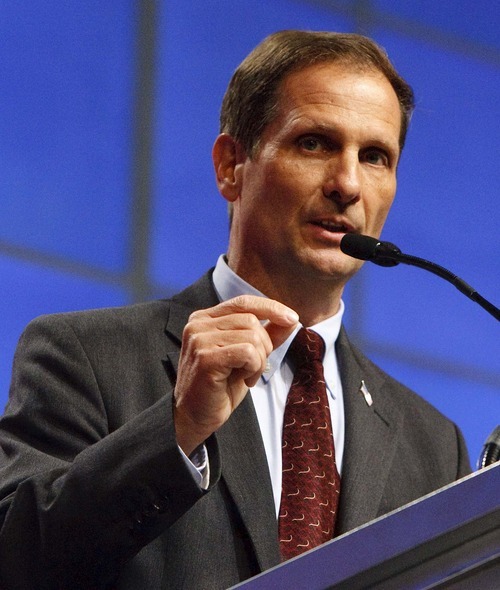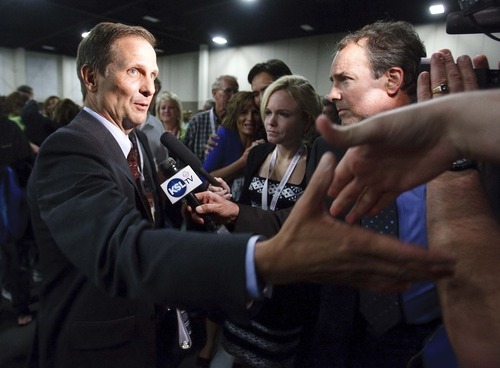This is an archived article that was published on sltrib.com in 2012, and information in the article may be outdated. It is provided only for personal research purposes and may not be reprinted.
Chris Stewart, the GOP nominee in Utah's 2nd Congressional District, is the target of a complaint filed by four fellow Republicans who allege he orchestrated a sham candidacy to steal the election at the state party convention in April.
Cherilyn Eagar, Howard Wallack, David Clark and Chuck Williams filed the complaint with the Federal Election Commission on June 14 and are asking the agency to investigate the alleged conspiracy and levy fines against Stewart for violations of the Federal Election Campaign Act.
"I'm a strong supporter of the Republican Party and I don't think this type of politics has any place in our party," Clark said. "We need to stop this kind of dirty campaign and those practices."
The complaint stems from an anonymous letter that a virtually unknown candidate — Eureka Mayor Milton Hanks — said was sent to delegates leading up to the state Republican convention April 21 that alleged the four candidates had crafted a deal to ensure Stewart wouldn't win the nomination by developing an "ABC Club" (Anybody But Chris Club).
Hanks delivered an explosive speech to delegates that resulted in a chaotic series of events that left Eagar, Wallack, Clark and Williams unable to rebut Hanks' allegations before delegates voted.
The 14-page complaint charges the Stewart campaign with creating the letter to destroy the four candidates' chances of securing the nomination and includes a list of witnesses who received the missive just days before the convention. The complaint also alleges Hanks was a supporter of Stewart in early February before deciding to jump into the race himself and filing a statement of candidacy on Feb. 24. Hanks on Monday denied the charge and said he supported Bob Fuehr for Congress before entering as a candidate himself.
The complaint uses a working theory based on witness accounts that the four Republicans say reveals an impossible timeline between reception of the anonymous letter and the Stewart campaign's response to the letter — all within 23 hours.
And it also dismisses the Stewart campaign's claim that it didn't know anything about the letter as "not logical. The complaint said the campaign wouldn't have crafted a response to a letter they didn't know existed and "the only reasonable conclusion is that the Stewart campaign and/or its agent(s) pre-planned both the Anonymous Letter and the CS (Chris Stewart) letter."
The Stewart campaign issued a statement Monday evening saying it welcomed an FEC investigation and that it ran an ethical campaign.
"After reviewing the FEC complaint, this much is very clear: this is an example of a few candidates who performed very poorly at the state convention, got caught playing dirty politics and are now trying to protect their political futures by accusing the target of their dirty campaign," Stewart said.
Hanks called the FEC complaint "bull."
But Hanks never mounted much of a campaign and barely registered as a blip among the 10 candidates running for the GOP nomination.
Weeks after Hanks accused the four candidates of conspiring against Stewart, resulting in a state GOP investigation that found no wrongdoing, he apologized to state party leaders by saying, "It was unfair of me to not verify that my suspicions were true before making accusations during my speech. The party is better than this. Utah is better than this."
Republican Party Chairman Thomas Wright, as a part of the investigation, asked for anyone who had more information on the matter to bring information forward. State party leaders were discussing the complaint Monday night.
Eagar said she hoped the FEC filing would translate into broader reforms.
"The party was not able to pursue deeply enough to determine who was responsible for sending out the anonymous letter," Eagar said. "We hope that will be discovered and we hope collectively to right some of the wrongs that have been happening in political campaigns."
Stewart won the nomination at the convention by capturing just enough votes to hit the 60 percent mark — edging out former Utah House Speaker David Clark for the nod. Before that vote, Eagar, Wallack and Williams all stepped aside and threw their support to Clark in a move that some believed proved the ABC allegations to be true.
Stewart's general election opponent, Democrat Jay Seegmiller, issued a statement after the FEC filing, saying it "deeply disturbed" him.
"Today's developments among the Republican candidates are a symptom of a larger disease," Seegmiller said. "These dirty campaign tactics are exactly what need to be excised from our political culture. "
The Stewart campaign has 15 days from receipt of the complaint to respond to the FEC regarding the allegations.
Twitter: @davemontero





